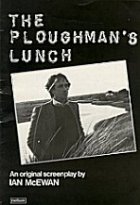
The Ploughman's Lunch Page #6
- R
- Year:
- 1983
- 107 min
- 365 Views
JAMES:
I'll ring you in the next couple
of days.
Mr. Penfield stands and nods. This is a familiar exchange.
Finish on him.
INT. BARBICAN ARTS COMPLEX - AFTERNOON
James and Susan arrive at the Barbican together. Their
conversation is a little detached from its subject matter.
They are feeling each other out. They are not disagreeing
here. As they talk they make a complicated route through
the Arts Centre, always on the verge of getting lost.
JAMES:
What did you think of that Wadja
film?
SUSAN:
enthusiastic as everyone else.
JAMES:
I thought it was tremendous.
SUSAN:
I think it went on rather too long.
JAMES:
I couldn't bear for it to end.
SUSAN:
And I didn't like that man.
JAMES:
Oh, but he was terrific.
SUSAN:
And the shape of it all. It was
sort of...shapeless.
JAMES:
flashbacks were extremely good.
INT. LIFT - AFTERNOON
JAMES:
You don't like flashbacks because
your mother's a historian.
SUSAN:
Good theory. But I like my mother.
I have no aversions to what she
does.
JAMES:
Too bad. What did your father do?
SUSAN:
My real father? Well, he was a
flashback.
They laugh as they step out of the lift.
INT. BARBICAN ART GALLERY - LATE AFTERNOON
A little later. A Private View. A discreetly murmuring,
wine, canapés.
The paintings - painfully pretentious - represent various
forms of aesthetic self-consciousness.
James and Susan look at the pictures, but make no reference
to them. They spend a little time in front of each one
before moving to the next. James speech is broken by
moments of contemplation. As they move on again, he picks
up his thread.
JAMES:
Everyone describes the same process.
At first it is exciting. You're
at the centre of the world. As
soon as anything happens, you're
the first to know about it. And
there are deadlines a dozen times
a day, even more, and that's
intimidating and exciting. Then
you get the hang of it and the
excitement wears off. Your a clerk
in a rather dowdy Office. There's
none of the glamour of television,
or the penetration of serious
journalism. You're a processor of
semi-official news. Some people
leave at this stage. Then, if you
hang on, and especially if you're
promoted, you discover a new kind
of pleasure. You're pleased by
the ease with which you can write
summaries and bulletins from news
agency printouts, by the way you
ca judge length. Ending a broadcast
on the dot, having everything run
smoothly, selecting a running order
that makes sense, knowing
instinctively what you can and
cannot do. Professionalism.
SUSAN:
And you're at this third stage
JAMES:
No, there's a fourth. Numbness.
You do everything right, but you
SUSAN:
I think you're exaggerating. And
if you aren't, you should jolly
well change your job.
JAMES:
Oh yes?
SUSAN:
Yes. You're much too old to making
a drama out of alienation, or
whatever you call it. You've got
to take responsibility for your
own happiness. That's what I think
anyway.
Susan has moved on a couple of steps and is bending forwards
to look at a picture. James smiles at her wonderingly, a
little deflated, but impressed.
INT. JAMES' FLAT - EVENING
Jeremy is sprawled in a chair with a drink. James is
standing. Muted piano music from the stereo. EDWARD has
just entered. The other two have been waiting for him.
JAMES:
It's the Poet Laureate himself.
Edward approaches. He is a contemporary of the other two,
but looks much younger and less worldly in manner. He is
slightly nervous. He works on a literary magazine and he
is a poet whose work is just beginning to be recognised.
The three are old friends. Jeremy and James keep up their
friendship with Edward because they recognise his talent,
and this makes them feel more authentic. Edward keeps up
with them because he is lonely and his own life is rather
dull. However, he does distrust them a little. And they
Translation
Translate and read this script in other languages:
Select another language:
- - Select -
- 简体中文 (Chinese - Simplified)
- 繁體中文 (Chinese - Traditional)
- Español (Spanish)
- Esperanto (Esperanto)
- 日本語 (Japanese)
- Português (Portuguese)
- Deutsch (German)
- العربية (Arabic)
- Français (French)
- Русский (Russian)
- ಕನ್ನಡ (Kannada)
- 한국어 (Korean)
- עברית (Hebrew)
- Gaeilge (Irish)
- Українська (Ukrainian)
- اردو (Urdu)
- Magyar (Hungarian)
- मानक हिन्दी (Hindi)
- Indonesia (Indonesian)
- Italiano (Italian)
- தமிழ் (Tamil)
- Türkçe (Turkish)
- తెలుగు (Telugu)
- ภาษาไทย (Thai)
- Tiếng Việt (Vietnamese)
- Čeština (Czech)
- Polski (Polish)
- Bahasa Indonesia (Indonesian)
- Românește (Romanian)
- Nederlands (Dutch)
- Ελληνικά (Greek)
- Latinum (Latin)
- Svenska (Swedish)
- Dansk (Danish)
- Suomi (Finnish)
- فارسی (Persian)
- ייִדיש (Yiddish)
- հայերեն (Armenian)
- Norsk (Norwegian)
- English (English)
Citation
Use the citation below to add this screenplay to your bibliography:
Style:MLAChicagoAPA
"The Ploughman's Lunch" Scripts.com. STANDS4 LLC, 2025. Web. 22 Jan. 2025. <https://www.scripts.com/script/the_ploughman's_lunch_500>.







Discuss this script with the community:
Report Comment
We're doing our best to make sure our content is useful, accurate and safe.
If by any chance you spot an inappropriate comment while navigating through our website please use this form to let us know, and we'll take care of it shortly.
Attachment
You need to be logged in to favorite.
Log In